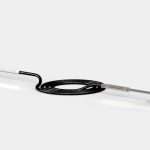
Thermocoax capacitive sensors technology for new-generation gas turbines in military and commercial aviation.
Capacitive Sensors for the 21st Century
New-generation gas turbine engines are increasingly complex. That complexity also comes with increasingly high internal temperatures and an accompanying need for improved monitoring and greater efficiency.
Our R&D team have designed capacitive sensors using ceramic or metal brazing that can function perfectly up to 1300°C. Thermocoax capacitive sensor technology monitors blade tip clearance, blade tip timing and debris to improve the efficiency of gas turbines. This real-time information is analysed by maintenance teams on the ground so that they can respond correctly before touchdown.
Custom Engineering for the Powergen Sector
Built to customer specifications, Thermocoax capacitive sensors are supplied to gas engine and aircraft equipment manufacturers such as Rolls Royce, Safran, CFM International, General Electric. With partners in EU and US on commercial and military gas engine projects, Thermocoax has supplied more than 5000 sensors for engine developement and certification and deployed more than 2000 debris monitoring capacitive sensors.
Improving Efficiency and Saving Time
Thermocoax sensors are available as full or pseudo models with cutting-edge triaxial technology for high signal quality during transmission and shielding from electrical or electromagnetic disturbances. In-house mineral insulated cabling is deployed and available in diameters as small as 1.5mm for integration in the smallest of spaces. 100% traceability of all raw materials used in the sensors is guaranteed.
The beauty of the Thermocoax ceramic brazing solution is that the sensors and brazing can function at 1300°C and, unlike our competitiors, no cooling system is required. This saves test engineers time and money when testing. Moreover, the strategic technology developed by THERMOCOAX means that a large range of designs can be offered to fit where space is a premium.
Full or Pseudo Triaxial Technology at 800/1300°C
Our 800°C capacitive sensors are available with full or pseudo triaxial technology. The cabling is triaxial, whatever the design. However, for the full version, the sensors for electrode, casing and body are also triaxial. The signal on the central wire, connected to the electrode, has two protective screens (guard and body). This offers protection against magnetic and electrical disturbance.
The pseudo triaxial technology for 800/1300°C is specially designed for clients who want the smallest possible sensors. The guard is removed, leaving only the electrode and body in the sensor. The lead cable remain full triaxial. Pseudo has been demonstrated to deliver almost the same results as the full technology.
Adding value to thermal sensor solutions
THERMOCOAX has a 15-year record in gas turbine design. Added to the proprietary mineral cabling designs, R&D teams have developed groundbreaking ceramic brazing technology for monitoring in today’s powergen turbines.
No-cooling capacitance sensors : Technical data
Full Triaxial Technology 800°C Capacitance Sensor :
- Triaxial sensor and triaxial cable
- Adapted for static and dynamic mode
- Fully shielded from electrode to cable connector
- Electrode and body Inconel 600
- 800°C working temperature
- 1100°C peak temperature
- Electrode Ø3mm to 7mm
- Range up to 10mm
- 1% accuracy average
Pseudo Triaxial Technology 800°C Capacitance Sensor :
- Coaxial sensor and triaxial cable
- Adapted for dynamic mode only
- Electrode and body Inconel600
- 800°C working temperature
- 1100°C peak temperature on face
- Electrode Ø1.5mm to 5mm
- Available in dual electrode version for highly accurate tip timing measurement
Pseudo Triaxial Technology 1300°C Capacitance Sensor :
- Coaxial sensor and triaxial cable
- No cooling system required
- Adapted for dynamic mode only
- Electrode platinum and body Inconel600
- 1300°C working temperature
- 1400°C peak temperature on face
- Electrode Ø4.25
For more detailed specifications and information about our capacitance sensors, please do not hesitate to request a quote.

